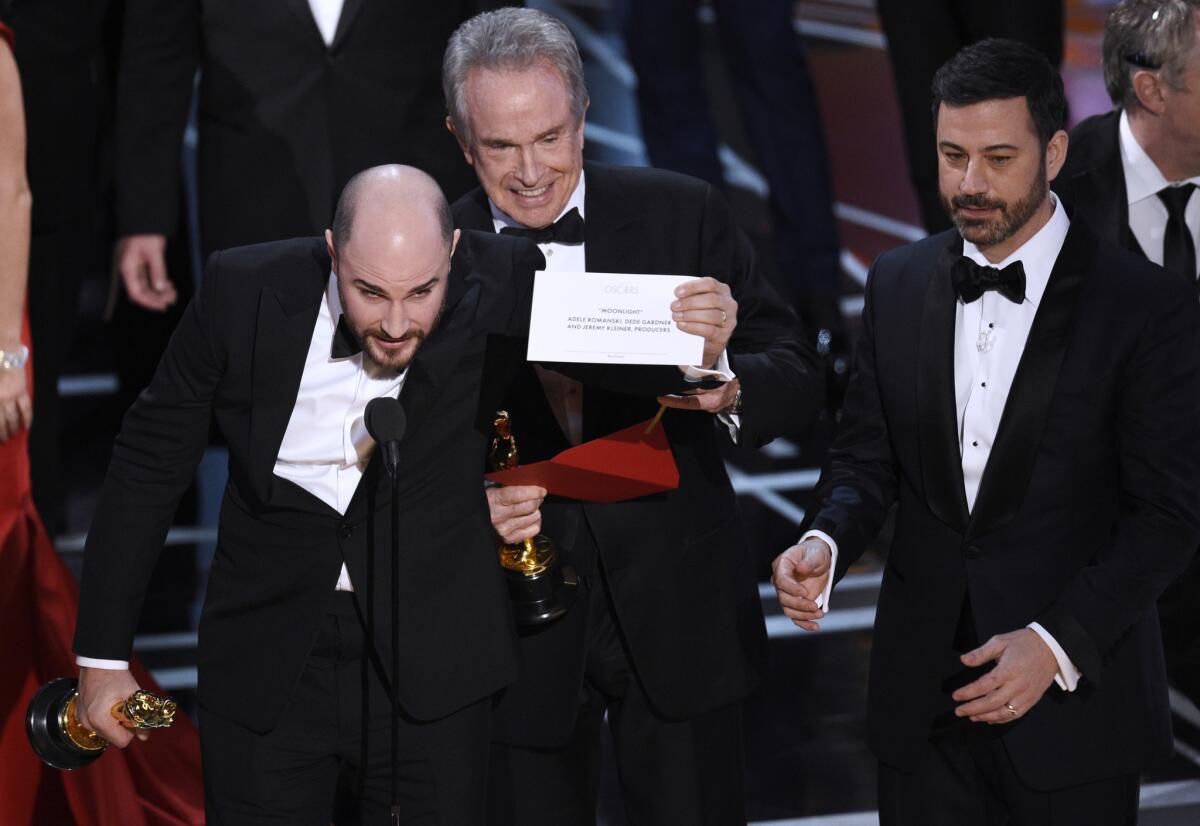Oscar ratings, still in the doldrums, fall to 9-year low

The debacle may go down as one of the wildest moments ever on an Oscars telecast.
But the extraordinary scene — in which the wrong movie was announced for best picture at the end of the show — had no impact on anemic ratings for Hollywood’s biggest night.
The 89th Academy Awards was watched by an average of 32.9 million viewers Sunday, down about 4% from last year, when the telecast averaged 34.4 million viewers, according to preliminary national ratings from Nielsen.
It was the smallest Oscars audience since 2008 and the third consecutive year that ratings have dropped. Among the explanations: the lateness of the show and the high number of nominations for smaller-budget films. The promise of strong criticism of President Trump from the Oscars participants may also have put off some viewers.
“The dip in ratings can possibly be attributed to its very late running time, the box-office receipts for most of its little seen but highly acclaimed movies, and the fact that some might have thought it would be another politically laden awards show, which turned some people off in recent months,” said Billie Gold, vice president and director of programming research at the media buying firm Amplifi US.
A crowded televised awards season (the Golden Globes and the Screen Actors Guild Awards precede the Oscars) and the tendency of younger viewers to spend more time watching video on their digital devices may have further depressed viewership. Nielsen data do not count those who watched the show via streaming.
Viewers and the audience inside the Dolby Theatre in Hollywood were stunned after learning the best picture statuette was mistakenly given to the producers of “La La Land” when presenters Warren Beatty and Faye Dunaway read from the wrong envelope. A chaotic scene ensued on stage as the award went to “Moonlight” before the telecast signed off.
The best picture award was presented — and re-presented — after Nielsen’s measurement of the Oscars telecast ended at 12:02 a.m. Eastern when ABC aired its last commercial break of the night. The program went off the air at 12:10 a.m. Eastern.
The late end time for the telecast also likely depressed the size of the audience. The Academy Awards end time was the latest since 2002, when it ended at 12:34 a.m. Eastern. Last year’s telecast ended at 11:51 p.m. Eastern.
There is some evidence of a political split in the audience based on the overnight ratings in individual markets.
The highest-rated markets for the telecast were New York, with a 31.1 rating, followed by San Diego (30.7), Los Angeles (30.5), Chicago (30.5), San Francisco (30.3), Philadelphia (25.3), Seattle (24.7), Boston (24.1), Denver (23.4) and Washington, D.C. (23.2). With the exception of Philadelphia, the markets were all in states that supported Trump’s 2016 Democratic opponent Hillary Clinton.
The lowest-rated markets — Memphis (10.6), Dayton, Ohio (11.3), Winston-Salem, N.C. (11.4) and New Orleans (12.6) — were all in states that went for Trump.
An overnight ratings point represents a percentage of homes in a market.
It’s uncertain whether the disarray at the end of the telecast did anything to hurt the Academy Awards’ brand going forward.
Gold doesn’t see any long-term damage to the show’s appeal among audiences.
“It reflects the power of live TV and true social moments that people love to remember and be part of,” Gold said. “In fact, I am sure those who weren’t watching or who went to sleep late were sorry they missed what transpired. We’re in a society that wants to capture unexpected moments and be part of it, and last night’s telecast was one of those moments.”
It helps when the Oscars ceremony celebrates a big box-office hit. The largest audience for the Academy Awards over the last 20 years was 55.2 million viewers in 1998 when “Titanic” — one of the biggest box-office hits of all-time — was honored for best picture.
While the Academy Awards has not reached those ratings heights in recent years, it still ranks as the most-watched entertainment program of the year, commanding ad rates of $2 million for a 30-second commercial. The event also has enhanced value for advertisers, as comparatively few viewers watch it on their DVR.
Twitter: @SteveBattaglio
ALSO
Complete list of Oscar winners and nominees
Oscars mistake could prove a major blow to PricewaterhouseCoopers’ reputation
Beyond Oscars’ best picture chaos, ‘Moonlight’ and ‘La La Land’ disrupt the status quo
UPDATES:
5:28 p.m.: This article was updated throughout.
12:09 p.m.: This article has been updated with additional details on the telecast.
8:42 a.m.: This article was updated with last year’s overnight rating for The Oscars.
The article was originally published at 10:40 a.m.
More to Read
Inside the business of entertainment
The Wide Shot brings you news, analysis and insights on everything from streaming wars to production — and what it all means for the future.
You may occasionally receive promotional content from the Los Angeles Times.











